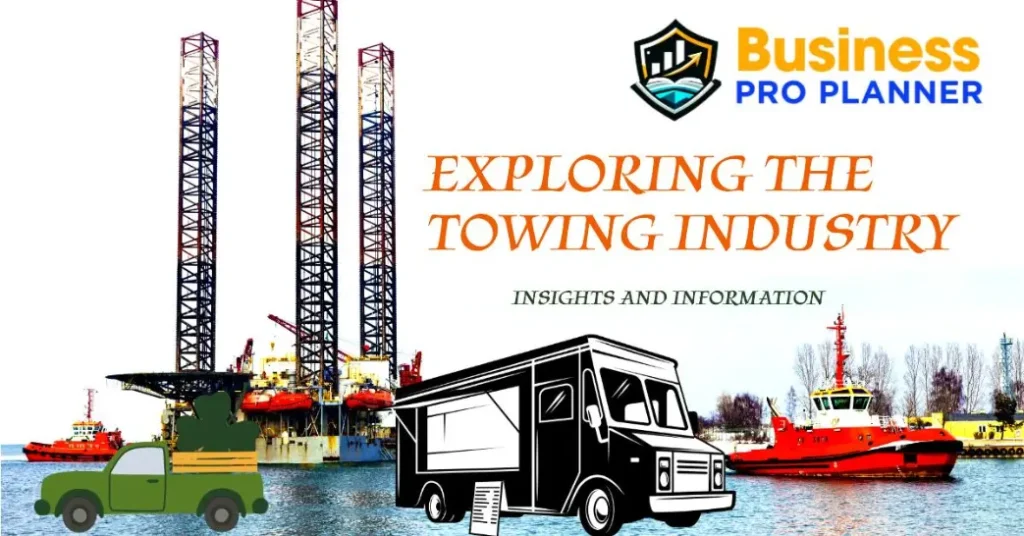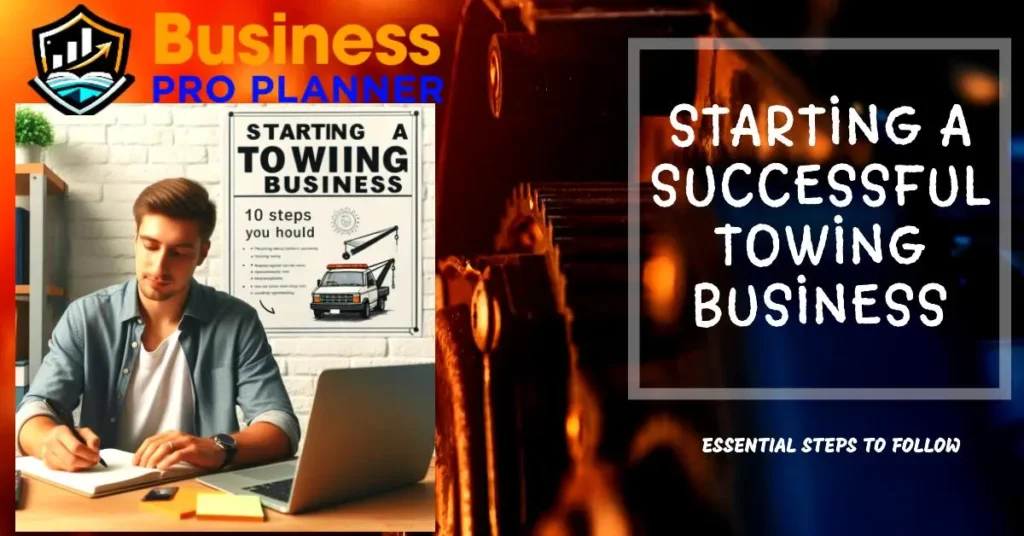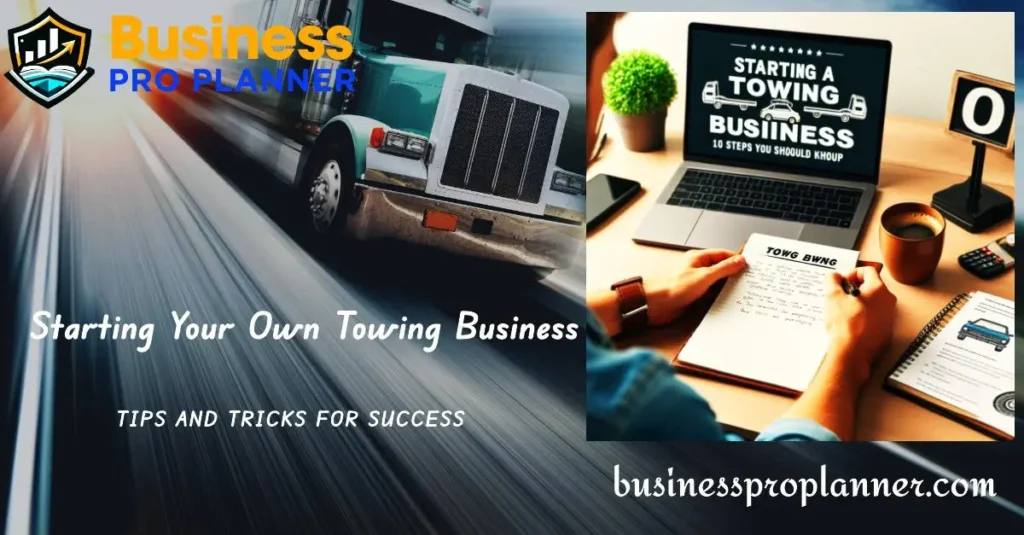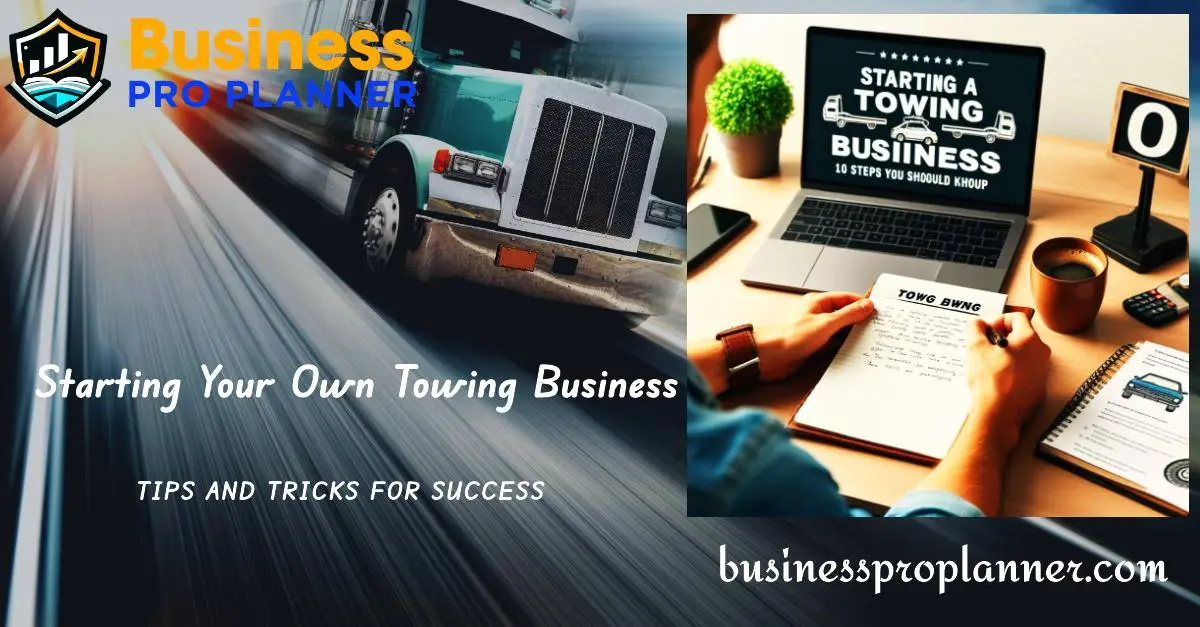Are you considering starting a towing business? The towing industry offers an opportunity to be your boss and operate a profitable service-based company. The question is how you can start a profitable towing business. However, launching a successful tow truck company requires careful planning, preparation, and understanding of the key elements involved.
The towing industry is dynamic, with demand for dependable tow truck businesses and roadside assistance services consistently present across most regions. Whether offering automobile towing, recovery services, or non-consensual tows, a well-run towing business can secure a steady customer base by providing reliable and responsive service.
Our expert guide will cover the essential steps to start your towing business. From conducting market research, developing a business plan, obtaining required licenses/permits purchasing equipment, hiring staff, and marketing your services effectively, we have got you covered. We have also navigated the complexities of the towing industry to achieve long-term growth and profitability.
Understanding the Towing Industry

Industry Overview and Growth
The towing sector in the United States is expansive and shows annual growth. It is estimated that over 18,000 tow truck companies currently operate across the country providing essential roadside assistance and vehicle recovery services. Annual sales in the industry exceed $10 billion.
The increasing number of vehicles on the road, higher mileage driven annually, and a growing frequency of accidents and breakdowns are boosting the need for towing assistance. As vehicles today become more complex with advanced electronics and smaller repair shops, towing operators are relied on even more for quick response in emergencies. Changes in state laws mandating towing for incidents like DUIs have also expanded the industry.
With over 260 million registered vehicles in the US creating millions of towing situations per year, opportunities abound for new entrants. Established tow truck businesses have seen steady 3-5% annual growth by expanding their coverage areas and the range of transportation-related services offered to include repairs, storage, and salvage in addition to basic towing and vehicle recovery.
The long-term outlook remains positive as the need for roadside assistance and fleet operators grows along with automobile usage across the United States. This stable demand makes starting a towing company a viable business venture.
Trends and Challenges
- Emphasis on environmentally-friendly practices, with towing companies exploring alternative fuel options and implementing sustainable practices to reduce their carbon footprint.
- Skilled tow truck drivers are in high demand, surpassing available supply, leading to workforce shortages. Retaining experienced personnel and attracting new talent has become a priority.
- Enforcement of regulations and prevention of illegal or unethical practices, such as predatory towing or price gouging. Clear rules and standards are being established by business groupings and regulatory bodies.
- Technological disruptions, including advancements in dispatch systems, communication tools, and vehicle tracking capabilities.
- Evolving customer expectations, with consumers seeking prompt, reliable, and convenient towing and roadside assistance services.
Characteristics of Tow Truck Drivers in the Workforce
- Hold a valid commercial driver’s license (CDL) that has the required endorsements to operate heavy-duty vehicles.
- Maintain an exemplary driving record and show a strong commitment to safety while driving.
- Exhibit strong customer service skills, effective communication, empathy, and problem-solving abilities.
- Possess physical strength and stamina to maneuver heavy equipment, lift, and secure vehicles in various conditions.
- Show off your technical expertise and be prepared to work a variety of hours, including late evenings, weekends, and holidays.
- Have a distinct combination of abilities and qualities that make them ideal for this challenging occupation.
Pros and Cons of a Towing Business
Beginning a towing business can offer gratifying opportunities, yet it’s crucial to carefully consider the advantages and disadvantages before diving in. The following are some significant benefits and possible drawbacks to think about:
Pros:
- Steady Demand: Vehicles break down, get involved in accidents, or need to be relocated, ensuring a constant need for towing services. As a result, a steady flow of potential clients is produced.
- Recession-Resistant: Towing services are often needed regardless of economic conditions, making the tow truck industry generally recession-resistant.
- Flexible Schedule: As the owner of a towing business, you have the flexibility to determine your schedule and choose the amount of work that suits your preferences.
- Low Overhead Costs: Compared to other businesses, the overhead costs for a towing company can be relatively low, especially if you start with a used tow truck.
- Scalability: Once established, a towing business can be easily scaled by adding more tow trucks and staff to meet growing demand.
Cons:
- Excessive Initial Investment: Tow trucks, equipment, permits, insurance, and other start-up expenses must all be purchased with a substantial upfront investment when launching a towing company.
- Competition: In densely populated locations, the towing sector is particularly competitive. You will need to come up with strategies for drawing clients and setting your services apart.
- Demanding Work: Work is physically taxing, and towing entails long hours as well as the possibility of operating under hazardous or unfavorable weather conditions.
- Regulatory Compliance: Towing companies have to abide by a complicated web of laws, which include local legislation controlling towing procedures, insurance requirements, and licensing requirements.
- Customer Frustration: Handling clients who are frequently under stress as a result of auto accidents or breakdowns can be difficult; it calls for tolerance and great customer service abilities.
By carefully weighing these benefits and drawbacks, you may decide whether launching a towing company is a good fit for your objectives, available funds, and risk tolerance.
Steps Need to Start a Successful Towing Business

Conduct Market Research
Before diving in, thorough market research is crucial. Understand the local demand for towing services in your area and analyze the competition. How many tow truck companies currently operate nearby, and what towing services do they provide? Identifying gaps in the market can help you tailor your offerings.
It’s also essential to research and comprehend the relevant regulations governing towing businesses in your state/municipality. Look into licensing requirements, permits, insurance coverage mandates, and any restrictions on operating hours, service areas, or impound policies.
Craft a Comprehensive Business Plan
A well-defined business plan is the fundaments for any successful venture. Your towing business plan should include key elements like:
- Executive Summary: Highlight your vision, mission, and key objectives.
- Company Overview: Outline the type of towing business you’ll operate (sole proprietorship, partnership, limited liability company), ownership structure, and location.
- Market Analysis: Provide insights into your target market, competition, industry trends, and your unique selling proposition.
- Services: Services: List the many kinds of towing services you will provide, such as roadside assistance, recovery, impounding, light-duty towing, and heavy-duty towing.
- Operations: Detail your plans for acquiring tow trucks, staff hiring/training, equipment maintenance, dispatch systems, and service area coverage.
Estimate Startup and Operating Costs
An accurate cost breakdown is vital for planning and securing funding. Consider expenses like:
- Tow trucks (new/used purchase or leasing costs)
- Equipment (towing gear, tools, office equipment)
- Insurance (liability, commercial auto, business interruption, etc.)
- Licensing, permits, and registration fees
- Office/storage facility leasing or rental
- Employee wages and benefits
- Fuel, maintenance, and repair costs
- Marketing and advertising
- Legal and accounting fees
A new tow truck can cost anywhere from $50,000 to over $150,000, so research vehicle prices thoroughly. Opting for a secondhand tow truck, priced between $20,000 to $50,000 or higher, could be a more cost-effective choice.
Choose Your Business Structure
One crucial decision you will face is determining the type of business structure you prefer to operate. The main options are:
- Sole proprietorship: As the sole owner, you’re personally responsible for any debts or liabilities. Profits pass to your tax return.
- Partnership: Two or more owners share profits, losses, and responsibility. A written partnership agreement is essential.
- Limited Liability Company (LLC): Offers liability protection of a corporation with the tax benefits of a partnership. Members have full ownership of your business.
- Corporation: More complex to set up but provides liability protection for owners. Can issue corporate stock.
Because they require less startup money and are easier to run, LLCs and sole proprietorships are frequently the greatest business structures for towing companies. Consult with an accountant or lawyer to determine the best arrangement.
Choose a Business Name
Picking the perfect name is important for branding your new towing business. Opt for something memorable that indicates what you offer (e.g. “Reliable Towing”). Be sure the name is available as a web domain and for legal registration with your state.
Also, consider trademarks if your name could become widely recognized. Search business name databases to avoid conflicts before making your selection official.
Get Licensed and Permits
Before launching operations, you’ll need the proper licenses and permits from your state and local governments. Typical requirements include:
- Business License: Allows legal business operations. Often obtained from your city/county clerk.
- Tow Truck Operator License: Certifies drivers meet training and criminal background standards.
- Tow Truck Permits: Required inspections and permits for each tow vehicle.
- FFE Number: Federal Tax ID number from the IRS to pay taxes.
- DBA Filing: “Doing Business As” registration if using a company name.
Contact your state’s Department of Motor Vehicles and local permitting offices to understand all requirements to operate a towing business legally. Get licensed before making any service offers or purchases.
Define Pricing and Revenue Streams
Establish competitive and sustainable pricing for your towing services. Research average rates charged by local competitors for similar services. Consider factors like distance traveled, vehicle type, and additional services like winching or fuel delivery.
While automobile towing rates can vary, some standard fees in the towing industry include:
- Hook-up Fee: $50-$100 (for connecting the vehicle to the tow truck)
- Mileage Rate: $3-$5 per loaded mile
- Hourly Rate: $100-$200+ per hour (for labor-intensive services)
Beyond towing fees, explore potential revenue streams like vehicle storage/impound fees, battery jump/tire change services, or markup on equipment sales.
Outline Marketing Strategies
Effective marketing will be crucial for attracting customers and growing your new towing business. Strategies to consider:
- Establish a professional website detailing your services, service area, contact information, and customer testimonials.
- Claim listings on online directories like Google My Business, Yelp, and industry-specific platforms.
- Leverage social media (Facebook, Instagram) to showcase your work, share useful content, and engage with the local community.
- Brand your tow trucks with company logos, contact details, and website address for increased visibility.
- Build relationships with local auto repair shops, dealerships, and body shops that can refer customers.
- Offer discounts or package deals to retain existing customers and incentivize referrals.
Secure Insurance Coverage
Towing businesses face several risks, so it’s crucial to obtain comprehensive insurance policies to protect your company, employees, and customers. Work with a reputable insurance provider to secure:
- Commercial Auto Insurance: Covers damages/injuries from accidents involving your tow trucks.
- General Liability Insurance: Protects against claims related to property damage, bodily injury, or negligence.
- On-Hook/Cargo Insurance: Covers damages to vehicles being transported.
- Worker’s Compensation Insurance: Mandatory coverage for employee injuries/illnesses sustained on the job.
- Garage Liability Insurance: This covers property damage or injuries that occur at your business premises.
Adequate insurance is not only legally required in most regions but also critical for safeguarding your business’s financial well-being.
Procure Tow Trucks and Equipment
With funding secured, it’s time to invest in the necessary tow trucks and equipment to service your customers. Research and purchase tow trucks suited to the types of towing you’ll provide (light-duty, medium-duty, heavy-duty, flatbeds, etc.).
In addition to tow trucks, you will need essential equipment like:
- Towing slings, chains, straps, and hooks
- Wheel-lift systems and towing dollies
- Safety gear (cones, flares, reflective vests)
- Communication devices (radios, smartphones)
- Lockout kits for accessing locked vehicles
- Basic tools (wrenches, jacks, jumper cables)
Consider durability, reliability, and safety standards when selecting equipment and trucks. Establish a preventative maintenance schedule and stay up-to-date with inspections to maximize the lifespan of your investments.
Recruit and Train Employees
Dependable, customer-focused tow truck drivers and support staff are vital assets to any successful towing business. Hire a team with the right mindset, skills, and experience to represent your brand professionally.
During the hiring process, screen for:
- Valid CDL license with appropriate endorsements for operating tow trucks
- Clean driving record
- Experience in the towing/recovery industry
- Strong customer service and communication abilities
- Mechanical aptitude for basic repairs or troubleshooting
Provide comprehensive training on company policies, safety protocols, customer service best practices, equipment operation, paperwork procedures, and dispatch software/communication systems. Regular refresher training can ensure your team stays current on industry trends, regulations, and techniques.
Apply for Financing
The startup costs of a towing venture mean securing funding is usually necessary. Consider financing options like:
- Personal savings and loans from family/friends
- Bank business line of credit or loans based on your credit and plan
- Equipment financing specifically for trucks and specialized rigs
- Small Business Administration (SBA) backed loans
- Online small business lenders
Research terms thoroughly and try to avoid using personal assets like homes as collateral if possible. Start conversations early with multiple lenders.
Put Policies in Place
Every business requires standard documentation and operating policies for compliance, risk management, and growth. Develop these core items:
- Employee handbook and policies on benefits, protocols, and conduct
- Non-disclosure agreements protecting your trade secrets
- Customer forms for service agreements, payments, and disclaimers
- Vehicle and facility security plans
- Record retention guidelines for POs, receipts, permits, and more
- Trademark, copyright, and technology use policies
- Clearly document accounting and financial controls
Having compliant business policies creates stability as you hire employees and grow revenue. Review them with legal counsel.
Final Preparations Before Launch
Weeks before your opening date, tackle the remaining setup activities:
- Establishing your business bank account with proper legal titles
- Set up bookkeeping, payroll, and point-of-sale software
- Test your website, online quoting tools, and payment systems
- Apply for federal and state tax identification numbers and registrations
- File your final business formation and licensing paperwork
- Order necessary inventory, supplies, and materials
- Recruit and hire your initial employee support team
- Promote your grand opening through a formal announcement
Take time before flipping your sign to “open” to organize fully and plan a soft launch period with friends and family.
Run Your New Business Successfully
With proper preparation and by following the steps outlined here, you’re well set up to launch and run a thriving towing business. Some final tips for ongoing success include:
- Maintain positive vendor and client relationships through excellent service
- Cross-train employees and have backup coverage for absences
- Upgrade equipment prudently based on changing needs and technology
- Continually market through a combination of paid and organic methods
- Track key metrics like vehicle uptime, response times, and customer retention
- Get involved with the towing community through local groups and events
- Consider expanding services and coverage areas over time if demand warrants
- Streamline operations through technology investments where it makes sense
- Seek mentorship from more established towing company owners
With hard work and commitment to your customers, a towing business can be rewarding both financially and personally. Best of luck with your new towing venture!

Open Your Doors for Business
With your towing business legally registered, insured, equipped, and staffed, you are ready to officially open your doors to the public. Promote your grand opening through social media, local advertising, and by reaching out to prospective customers and partners.
During the initial launch phase, focus on building positive customer experiences and continuously improving your services. Gather feedback from clients, nurture relationships with referral sources, and refine your operations based on real-world learnings.
Remember, running a successful towing business is a continuous journey. Stay abreast of industry developments, seek opportunities to expand your services, and remain committed to delivering reliable, professional towing services to your local community.

